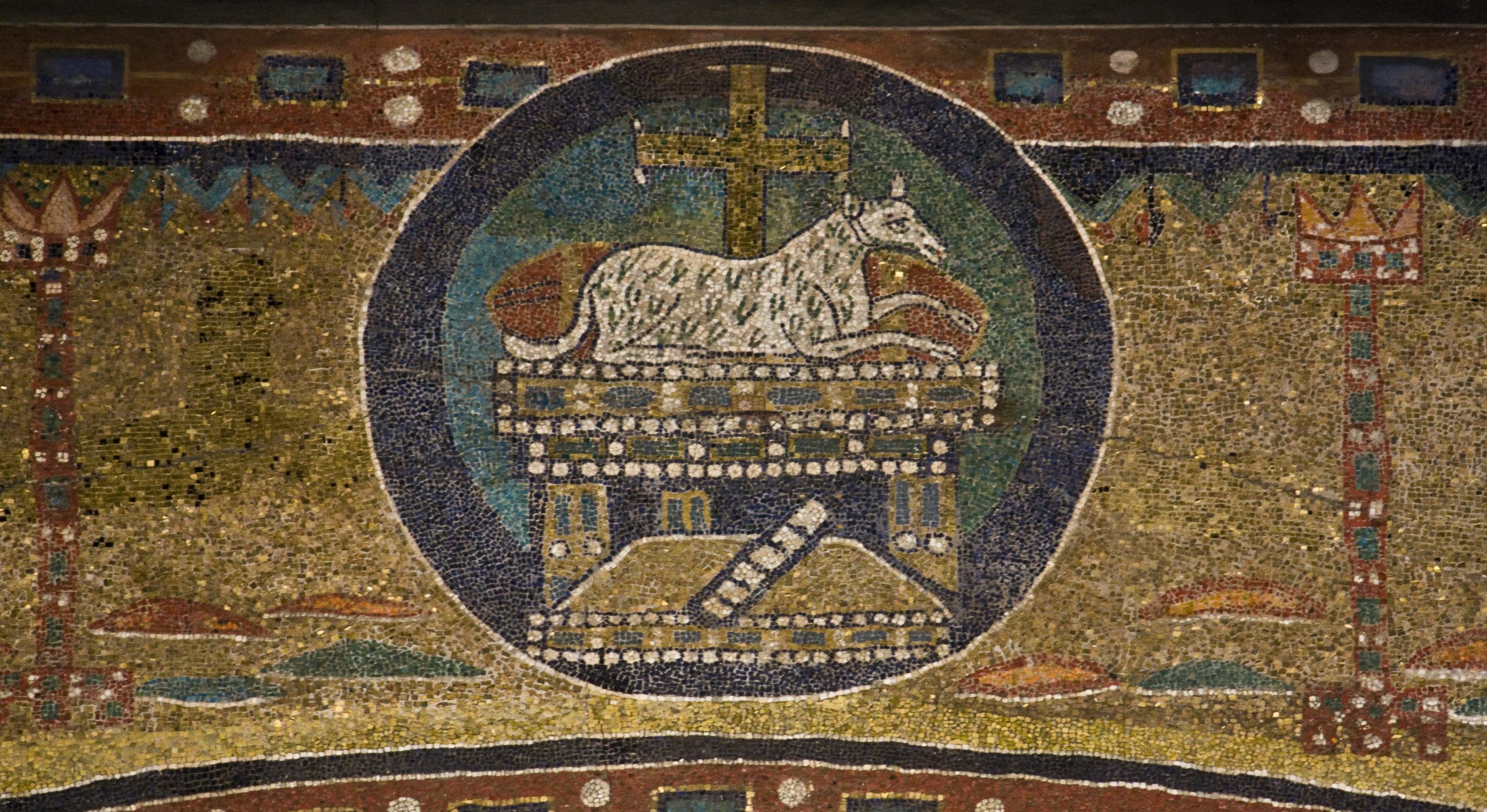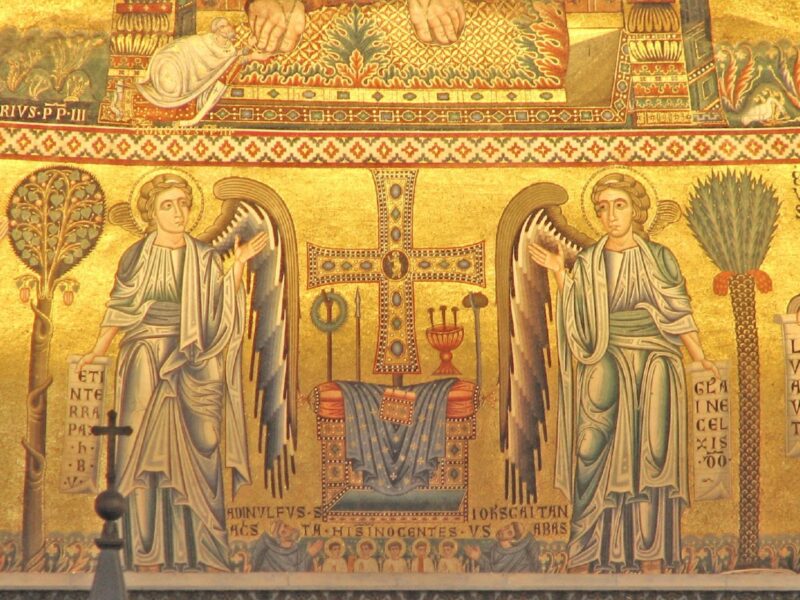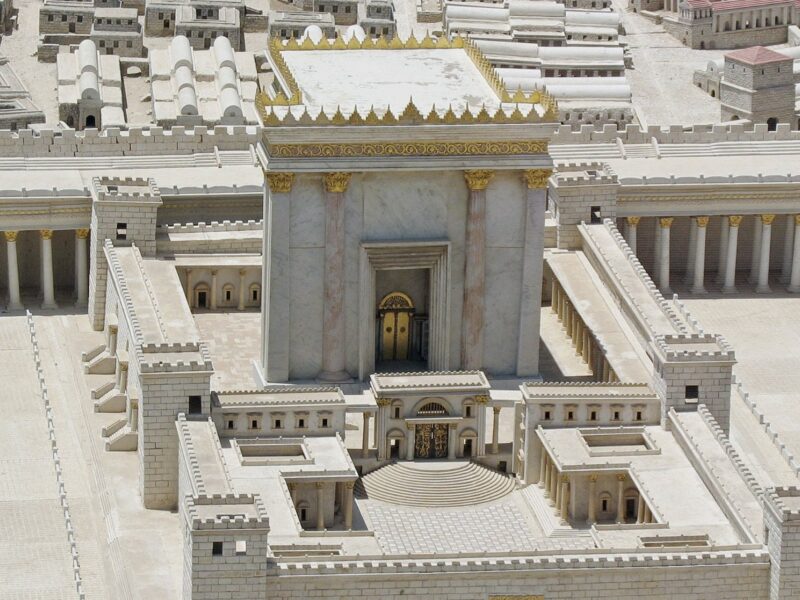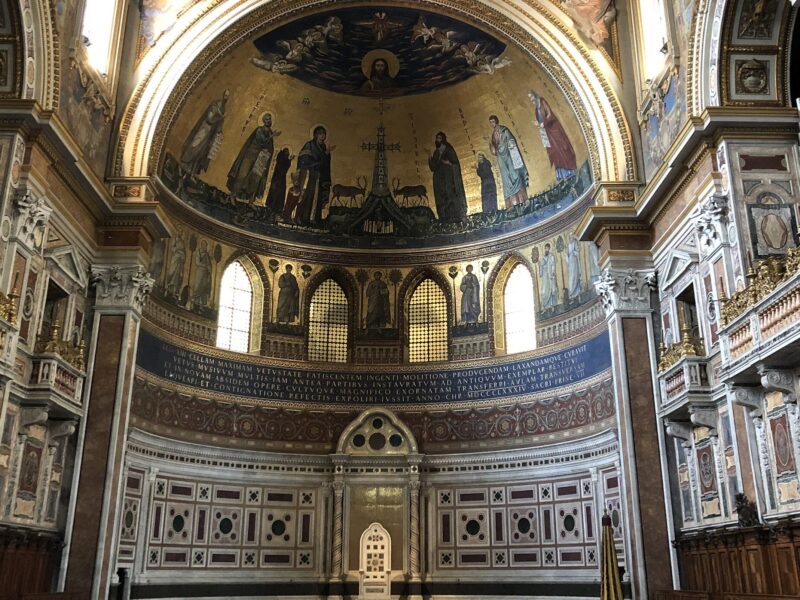
The Wood of the Bridge
Fifth Sunday of Easter. Fr Benjamin Earl discusses the meaning of our present liturgical season.
With all that has been happening in the Church in the last few weeks – the death of Pope Francis, his funeral, the election of Pope Leo XIV, and today’s solemn celebration of the inauguration of the new pontificate – we could almost be forgiven for forgetting that it is still Easter. Nevertheless, among all the other celebrations both sad and joyful, it is right to continue to wish each other ‘Happy Easter!’: the Lord is indeed risen.
The events of recent weeks perhaps providentially serve to remind us that the Christian’s Easter joy is not quite the unalloyed jubilation some might think. Easter may be a great celebration of resurrection, but no resurrection is possible if there is not first a death.
The term ‘Easter’ is something of a linguistic accident of English. The word originally had little to do with the Christian mysteries we celebrate at this time. Rather, it comes from the name of a pagan goddess, Ēastre, who was celebrated at the vernal equinox, which of course is always around the time we celebrate Easter.
The ‘official’ name for Easter Sunday, stripped from all its pagan influences, both of Ēastre and the of Sun God, is, translated literally, ‘The Lord’s Day of the Resurrection’.
And so you might think that this Eastertide should more properly be called ‘Resurrectiontide’ or something like that: the prolongation of the Lord’s Day of the Resurrection for seven weeks. But you would be wrong. A literal translation of the ‘official’ name for Eastertide is actually ‘Paschaltide’, or ‘Passover Time’ if you like. In this season it is not merely the resurrection which we continue to celebrate, but the whole of the Lord’s Passover, from this life, to death, to risen life and ultimately passing into heaven. We emphasise in this season the fulfilment of the Jewish Passover with the sacrifice of Christ, the new Passover lamb, and the ransoming of his people from sin by means of that sacrifice.
This recollection perhaps explains something of the choice of readings today. The gospel passage is taken from the last Supper, a little after the passage we read back on Maundy Thursday. We’re not glorying in the resurrection here, but rather preparing for Christ’s imminent departure, the gory glory of the cross, and his new commandment to love one another as he has loved us. That is, by giving our very lives.
The imitation of Christ’s love is a theme taken up in the first reading from the Acts of the Apostles. Paul and Barnabas say that Christians, like Christ, ‘through many tribulations… must enter the kingdom of God.’ Out of love for Christ and the people he calls, the disciple will have tribulations to endure.
In Europe we live in a land where society has grown perhaps so used to the Christian gospel that it has started to forget it, and has started to leave Christ behind; even believers may be infected by what Pope Leo in his first homily as Pope called a ‘practical atheism’. In the face of this challenge, all of us who would be friends of Jesus must embrace the cross.
Yes, we may be ‘mocked, opposed, despised, or at best tolerated and pitied’. But this is precisely how we are called to show love: as Christ has loved us. This is how we will be known as his disciples. Only with the wood of the cross can we build a bridge between the divine and this world. Only with the wood of the cross can any ‘pontiff’ – literally a ‘bridge builder’ – be successful in his task.
But this Eastertide also gives us hope: for what we are anticipating here, what we are building here, and what we are preaching here is the new Jerusalem, the city of God. Whatever we suffer now, what we preach is the city where there is no ‘mourning, nor crying, nor pain, for the former things [are passing] away’.
Whatever trials and tribulation we may endure, we proclaim the good news: proclaimed, yes, by the one seated on the throne of Peter, but more importantly proclaimed from the throne of the lamb: ‘Behold, I am making all things new.’
Readings: Acts 14:21-27 | Apocalypse 21:1-5 | John 13:31-33,34-35
Image: detail from the triumphal arch mosaic of Santa Prassede in Rome, photographed by Fr Lawrence Lew OP
The Pope’s homily, referenced above, can be found here.



Rudolf Carpanini
Thank you, Father, for the etymological explanation of the word Easter, and for its deeper spiritual significance. Though a nearly 90-year-old practising Catholic and academic, I did not know the etymology, while living the spiritual meaning of Easter requires a more profound Faith than I have.
There is also something of a problem between reconciling the joy that should derive from our knowledge of our heavenly destination with the enjoyment that derives from the pleasures of our God-created earthly existence. Rationally, there should be no problem. But existentially, the earthly joys often have the upper hand.
Should one feel guilty if one feels the love of God less than that one feels for a wife of 35 years one has just lost? Are we less holy if our love of human beings such as a father, a mother, a wife, a child is less than our loveof God? I know you will reply that Love is One, that in loving our dear ones we are partaking in the Divine Love. But permit me, Father, it doesn’t always feel like that.
Rudolf
Alejandro
Rudolf’s question echoes the anguished cry of the Lord on the cross: “My God, my God, why have you forsaken me?” Thankfully, however, we are not required to feel God’s love in a way that surpasses the love we feel for a lost loved one. That is a first-order desire, an immediate longing. Instead, it is enough to desire to desire God’s will—a subtler but profound aspiration. This task is easier, yet it still requires us to ask the Lord to grant us this grace, so that, like Him, we may say: “Not as I will, but as You will.”
I was deeply moved by Rudolf’s questions. There is a remarkable book that addresses this very struggle, which I highly recommend: Wandering in Darkness: Narrative and the Problem of Suffering by Eleonore Stump (Oxford University Press, 2010).